Latest News
SRSG Remarks at UN Security Council Debate on Afghanistan

Date : New York, 22 June 2015
I thank you for this opportunity to share UNAMA’s perspectives on recent developments in Afghanistan.
Since my last briefing to the Security Council, there has been progress in meeting Afghanistan’s challenges in three distinct but interrelated areas: the economic, the security and the political. Although such progress itself has been modest, this should not be undervalued.
It needs to be stressed that Afghanistan continues to be tested in meeting its benchmarks in all three areas. There is no room for complacency – failure in any one of these areas would have consequences for the overall success of the Afghan transition. It is absolutely clear that Afghanistan continues to need the support of the international community, as well as the sustained attention of this Council.
The economic contraction that followed the withdrawal of international military forces presents a continuing challenge to the Government to meet the fiscal gap; that is, the gap between the resources it can muster and the monies it must spend. Afghanistan is meeting and exceeding – admittedly modest – revenue targets. Nevertheless, Afghanistan is struggling to harness the resources to meet its governance commitments and its developmental priorities. At this time of continued low economic growth, we must also guard against the danger of an increasing shift into the illicit economy, particularly so in the case of burgeoning narcotics production.
Afghanistan is meeting its security challenges, but is nonetheless being increasingly tested. The Afghan National Security Forces [ANSF] have been undeniably stretched as they take on full security responsibilities. We have seen an intensification of conflict across the country, including in areas previously considered to be safe. Only yesterday, there were fresh challenges to Government security control in an area close to strategically important Kunduz City. And today there was a failed attack on parliament as it was about to review the nomination for the Minister of Defense.
While the ANSF face operational challenges, their commitment is beyond question and they are demonstrating resilience in the face of insurgent efforts to take and hold ground.
Foreign fighters from Afghanistan’s northern neighbors and elsewhere present a particular challenge. There also remains considerable concern that ISIL, referred to in Afghanistan as Daesh, is seeking to establish a foothold. This demands greater regional involvement and collaboration to address this shared threat. It seems inequitable that Afghanistan should be shouldering the burden of taking on terrorists whose points of origin and eventual destinations are its neighbors.
The determined outreach from Afghanistan to its neighbors is encouraging. Stronger relations between the Governments of Afghanistan and Pakistan are particularly noteworthy, amidst growing recognition of their shared interests.
Ultimately, deeper collaboration on the full range of political, economic and social issues will promote regional stability and prosperity.
The intensification of the conflict was as predicted. There has been higher attrition on both sides, but the most tragic index of this intensification is the toll on civilians – so far this year 4,216 civilians have been killed or injured. Just two days ago, 16 civilians, mostly women and children, were killed when a bus hit an improvised explosive device. Tragic though this is, sadly it was not an isolated incident, rather a typical event.
Such incidents take a terrible emotional and social toll on families, especially surviving widows, often left in the most appalling economic circumstances. Many other Afghans continue to be affected by the conflict, including those who have been displaced. Humanitarian assistance is often impeded by continued insecurity and, lamentably, humanitarian actors have been targeted.
The United Nations will continue to provide humanitarian support to those affected. UNAMA will work to increase levels of trauma care and meet the short term needs of the increasing number of those internally displaced. UNAMA will also continue to advocate with all parties, including the Taliban, to strengthen measures to ensure the protection of civilians.
On the political front, there has also been modest progress. Since I last briefed you, all the members of the cabinet have been appointed, even though one remains to be confirmed. As of this morning, 21 provincial governors have been appointed and there has been agreement on other significant appointments.
After long delays, the Government has committed to appoint the Electoral Reform Commission within a week, and to provide clarity on the electoral calendar within a month. The term of office of the lower house of the National Assembly, the Wolesi Jirga, was due to end today, without the election of the new members having taken place. The lack of clarity on the future of the current Wolesi Jirga had caused consternation, with the potential for public discord. Thankfully, just three days ago, President Ghani decreed an extension of the Wolesi Jirga until elections can be held.
Despite political tensions, Afghan institutions were able to work together to find solutions on sovereign issues. The United Nations looks forward to a decision on the date of the next elections, as well as action to implement the commitment to electoral reform. These steps will go a long way to reassuring Afghans that the democratic institutions and processes are able to fulfil their proper roles and to meet public expectations.
The most difficult aspect of the National Unity Government partnership has been in effecting appointments. With these largely now completed, and the cabinet in place, we can expect to see a more effective functioning of the Government.
Now is the time for a surge in delivery of public services, fulfillment of election promises, and implementation of the reforms set out in London and as promised in the ministerial 100-day action plans. The upcoming Senior Officials Meeting, in less than three months time, of the Tokyo Mutual Accountability Framework presents an opportunity to demonstrate real progress on the mutual commitments of donors and Governments to supporting governance reforms.
In reference to the request by the Security Council that the Secretary-General initiate an examination of the role, structure and activities of all United Nations entities in Afghanistan, I am pleased to update that we have now agreed with the Government to establish a Commission, comprised of representatives of the Government, the international donor community, UNAMA and affiliated agencies, funds and programmes; co-chaired by UNAMA and the Government. The terms of reference have been shared with the members and the Commission will commence its work shortly and we anticipate having a report ready for the Council by the time of its September meeting on Afghanistan.
Peace would have a major positive impact on the capacity of the Government to address its economic, security and political challenges.
In the long term, peace is not a luxury, it is a necessity. Unless Afghans can find a way to live together in harmony, Afghanistan’s political and security institutions and its economy simply may not be sustainable. Failure would have no beneficiaries.
Despite the disturbing security trends, or perhaps as a consequence, there has been a renewed interest in peace efforts to resolve the conflict.
In my last address I spoke of a unique alignment of circumstances that could be conducive to fostering peace talks.
Indeed, the essential ingredients for a peace process are present: a protracted violent conflict with little prospect of a military victory for either side; combined with clear signs of a growing interest in a peace process.
A conference hosted by the Qatari Government in early May reaffirmed the appetite for peace by a wide range of Afghans, showing the potential for progress to that end through dialogue. Since then, there have been several similar meetings in different locations, most recently in Oslo last week, which I attended.
These events confirm that Afghans want an end to the ever-present violence that does so much harm and which shows no signs of abating.
While the Government has repeatedly stated its readiness to engage in direct talks with the Taliban, what is still missing is a clear indication from the Taliban that they are ready to engage directly with the Government.
Without this direct engagement, no meaningful progress towards peace will be possible, a point that I continue to stress in my conversations with Taliban representatives. Conference pronouncements have been useful in clarifying positions, but can never be a format for a systematic engagement between empowered representatives on the conditions for, the agenda of, and the barriers to, an enduring peace. In short, a direct engagement is necessary for a negotiated agreement.
With leadership, peace is within reach. However, the intensification of the conflict is eroding the atmosphere for constructive negotiations. Just as the voices for peace are growing louder, so too are those who believe that peace is neither possible nor desirable or that the focus should now be on war.
It is thus critical that the international community as a whole, and the regional neighbors in particular, send the same message to all involved, unambiguously and forcefully: the time to begin direct peace and reconciliation talks is now.
UNAMA supports such a direct engagement between armed groups and the Government, has attempted to facilitate its realization and will continue to do so, in full consultation with the Government.
I would like to express, finally, my hope that, in this holy month of Ramadan, Afghans will be able to come together to worship in peace.
Thank you.

Latest News
Central Asian envoys meet in Astana for talks on Afghanistan

An extraordinary meeting of the Regional Contact Group of Special Representatives of Central Asian countries on Afghanistan was held at Kazakhstan’s Ministry of Foreign Affairs.
The gathering brought together representatives from Kazakhstan, Kyrgyzstan, Tajikistan, and Uzbekistan to discuss the situation in Afghanistan and explore avenues for practical cooperation, Kazakh foreign ministry said in a statement.
Yerkin Tukumov, Special Representative of the President of Kazakhstan for Afghanistan, emphasized the country’s commitment to constructive dialogue and identifying practical solutions to address pressing issues related to engagement with Kabul.
Discussions focused on enhancing trade and economic ties, expanding transit and transport corridors through Afghanistan, and addressing regional security concerns. Participants stressed the need for coordinated efforts among Central Asian states to ensure stability and promote sustainable development in Afghanistan.
The meeting concluded with a reaffirmation of the participants’ readiness to continue regular consultations and maintain working-level contacts under the framework of the Regional Contact Group.
Latest News
Afghanistan’s defense ministry unveils new military uniforms for armed forces
Speaking at the ceremony, Qari Fasihuddin said the uniform is designed to reinforce order, discipline, and a shared sense of purpose within the ranks.
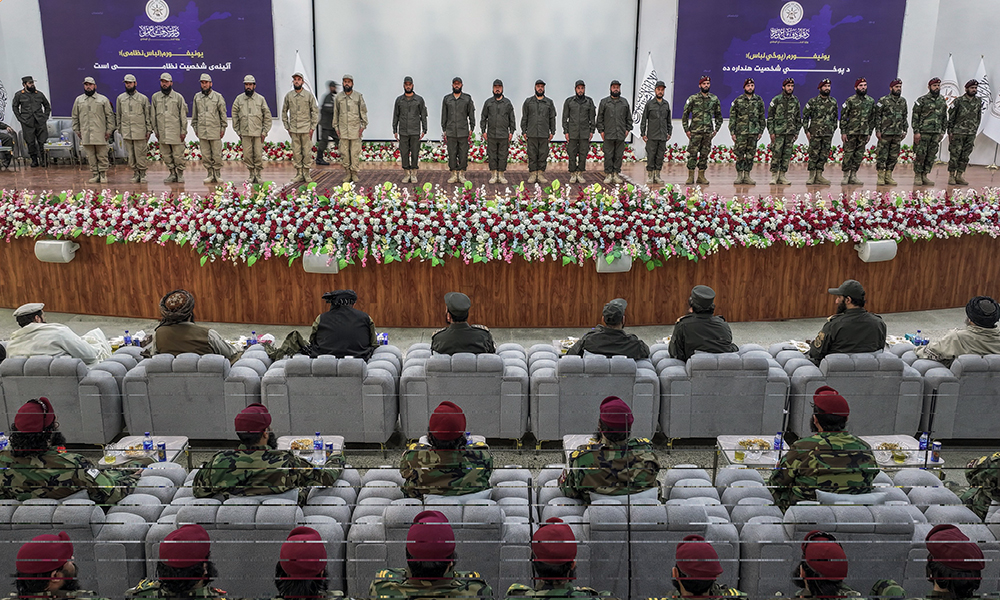
The Ministry of National Defense of the Islamic Emirate of Afghanistan officially unveiled a new uniform for the country’s armed forces on Monday.
The new attire, selected for commandos, border police, and the Afghan National Army, was introduced during a special ceremony held at the Ministry’s headquarters.
The event was attended by the Chief of Staff of the Armed Forces, Qari Mohammad Fasihuddin Fitrat, senior ministry officials, and commanders of central units. Officials emphasized that the new uniform represents discipline, cohesion, and a unified identity among all personnel.
Speaking at the ceremony, Qari Fasihuddin said the uniform is designed to reinforce order, discipline, and a shared sense of purpose within the ranks.
“This new uniform symbolizes unity and solidarity of our armed forces,” he said. “All those joining the ranks must see defending the country as their primary responsibility and commitment.”
Meanwhile, Enayatullah “Khowarzmi,” Head of Strategic Information and Publications at the Ministry, highlighted the importance of professionalism and ethical conduct.
He said; “Every soldier must have strong willpower, high moral standards, and strict adherence to military principles. Forces must remain resolute against enemies while serving the people with integrity and responsibility.”
According to ministry officials, the introduction of the new uniform is part of ongoing efforts to strengthen cohesion, discipline, and a unified identity among Afghanistan’s defense forces.
Latest News
Tashkent and Kabul discuss strengthening strategic partnership
The discussions come amid continued efforts by neighboring countries to maintain pragmatic engagement with Kabul despite ongoing political and economic challenges.
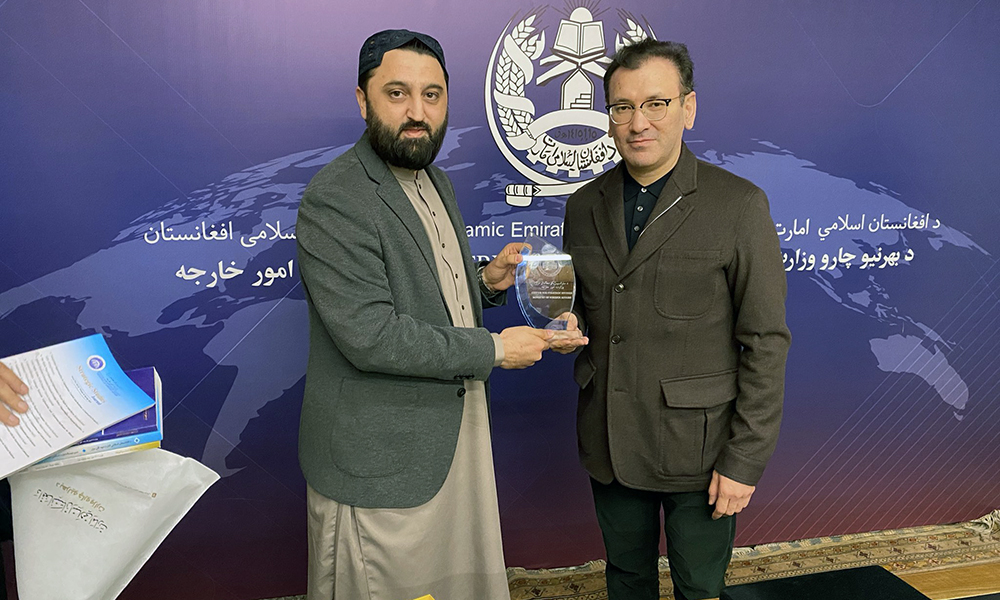
A senior Uzbek official has held talks in Kabul aimed at deepening political, economic and regional cooperation between Uzbekistan and Afghanistan, as both sides seek to translate long-term strategic goals into practical outcomes.
Javlon Vakhabov, Deputy Adviser to the President of Uzbekistan, met with Abdulhai Qanet, Head of the Strategic Studies Center at Afghanistan’s Ministry of Foreign Affairs, to discuss ways to enhance cooperation and advance joint agendas under the Uzbekistan–Afghanistan partnership.
In a post on X, Vakhabov said the two sides also explored initiatives to raise public awareness of developments in both countries and across the wider region, highlighting the importance of communication and public engagement alongside diplomatic efforts.
Uzbekistan has in recent years positioned itself as an active regional partner on Afghanistan, advocating dialogue, economic cooperation, and connectivity as key tools for promoting stability. Tashkent has supported regional infrastructure and trade initiatives aimed at linking Central and South Asia, while stressing that economic engagement can contribute to long-term security.
Vakhabov added that both sides are keen to turn long-term strategic objectives into concrete initiatives, with a focus on strengthening regional stability, collaboration, and shared interests.
The discussions come amid continued efforts by neighboring countries to maintain pragmatic engagement with Kabul despite ongoing political and economic challenges.
-

 Sport5 days ago
Sport5 days agoAfghanistan’s semi-final hopes hang in the balance after two T20 World Cup defeats
-

 Sport4 days ago
Sport4 days agoAFC U17 Men’s Asian Cup Saudi Arabia 2026 Draw sets stage for continental showdown
-

 World4 days ago
World4 days agoPressure rises on Dubai port giant DP World over chief’s alleged Epstein ties
-

 Sport4 days ago
Sport4 days agoWinter Olympics 2026: Wednesday brings records, first-ever golds and thrilling action
-
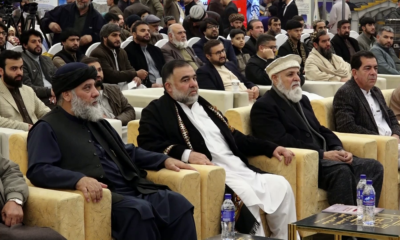
 Latest News4 days ago
Latest News4 days agoAfghanistan moving toward development and industrialization every day: Azizi
-
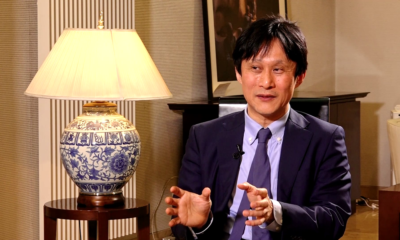
 Latest News2 days ago
Latest News2 days agoJapan maintains direct contacts with IEA officials through Kabul Embassy
-

 Latest News2 days ago
Latest News2 days agoUN warns mass return of Afghans from Pakistan and Iran is pushing Afghanistan to the brink
-
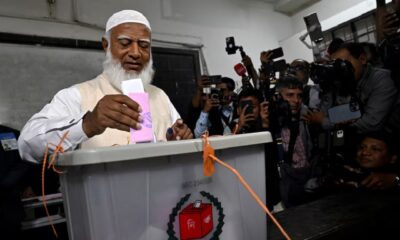
 Regional4 days ago
Regional4 days agoPolls close, counting begins in Bangladesh election after high turnout

















